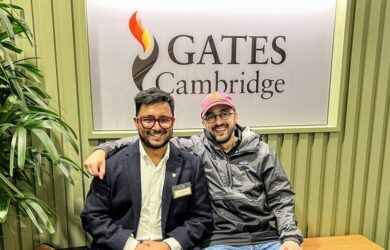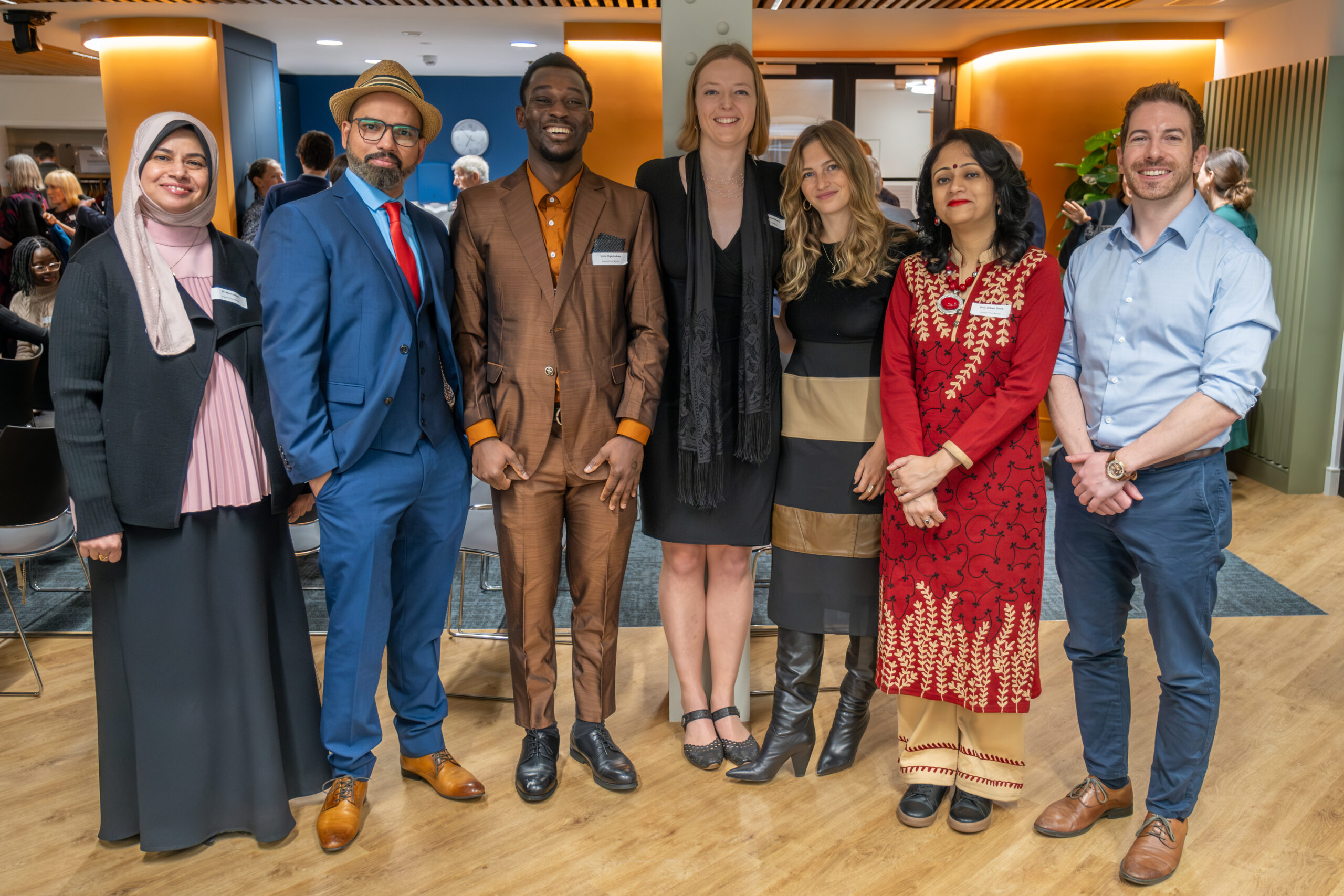
Eight outstanding scholars were awarded the Impact Prize in a ceremony at Bill Gates Sr. House on Friday
The Impact Prize makes me believe in the impact I can have in the next 25 years and gives me a new injection of motivation.
Professor Urbasi Sinha
Eight outstanding Gates Cambridge Scholars from a diverse range of backgrounds and disciplines accepted prizes on Friday night for the transformative effect their work is having in disciplines and sectors ranging from plant science and conservation to healthcare and human rights.
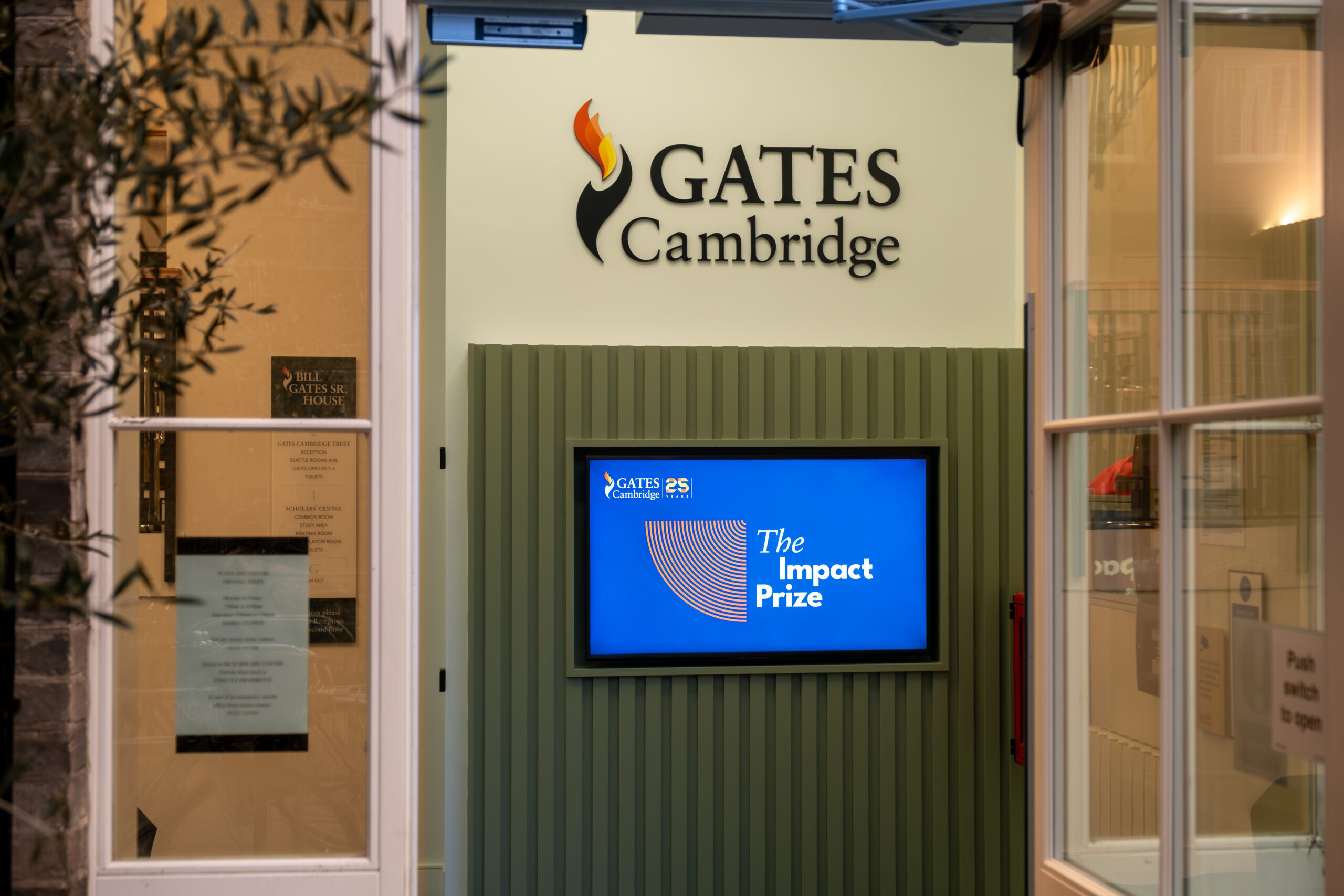 The Impact Prize ceremony, held at Bill Gates Sr. House, was introduced by Professor Deborah Prentice, Vice-Chancellor of the University of Cambridge and chair of the Gates Cambridge Trustees. She said that academic excellence and service were the hallmarks of the Gates Cambridge Scholarship, adding that many people aspire to make the world a better place, but Gates Cambridge Scholars “actually do it” and “go out into the world and leave their mark”. The ceremony, she said, was to celebrate those who have gone “above and beyond in making meaningful contributions in their fields”.
The Impact Prize ceremony, held at Bill Gates Sr. House, was introduced by Professor Deborah Prentice, Vice-Chancellor of the University of Cambridge and chair of the Gates Cambridge Trustees. She said that academic excellence and service were the hallmarks of the Gates Cambridge Scholarship, adding that many people aspire to make the world a better place, but Gates Cambridge Scholars “actually do it” and “go out into the world and leave their mark”. The ceremony, she said, was to celebrate those who have gone “above and beyond in making meaningful contributions in their fields”.
Professor Eilís Ferran, Provost of Gates Cambridge, outlined the aims of the scholarship programme and the work being done to amplify its effect and to ensure that Scholars could continue to have a ripple effect, taking their passion and commitment into the world for years to come.
The prize ceremony was presided over by Professor Sir Leszek Borysiewicz, chair of the judging panel and former Vice-Chancellor of the University of Cambridge. He said the criteria the judges based their decision on were innovation, transformative effect and sustainability – their possibility of making a long-term difference.
 Each winner gave an acceptance speech. Professor Urbasi Sinha [2002 – pictured right], whose wide-ranging work on quantum science and quantum science diplomacy was recognised, said she felt “privileged to be in the company of such extraordinary talent”. “This is a group that defines what impact is all about,” she stated. Professor Sinha spoke about her pioneering research in India and Canada and her work on the Open Quantum Institute, advocating for the integration of quantum science in work towards the Sustainable Development Goals. She said: “The Impact Prize makes me believe in the impact I can have in the next 25 years and gives me a new injection of motivation.”
Each winner gave an acceptance speech. Professor Urbasi Sinha [2002 – pictured right], whose wide-ranging work on quantum science and quantum science diplomacy was recognised, said she felt “privileged to be in the company of such extraordinary talent”. “This is a group that defines what impact is all about,” she stated. Professor Sinha spoke about her pioneering research in India and Canada and her work on the Open Quantum Institute, advocating for the integration of quantum science in work towards the Sustainable Development Goals. She said: “The Impact Prize makes me believe in the impact I can have in the next 25 years and gives me a new injection of motivation.”
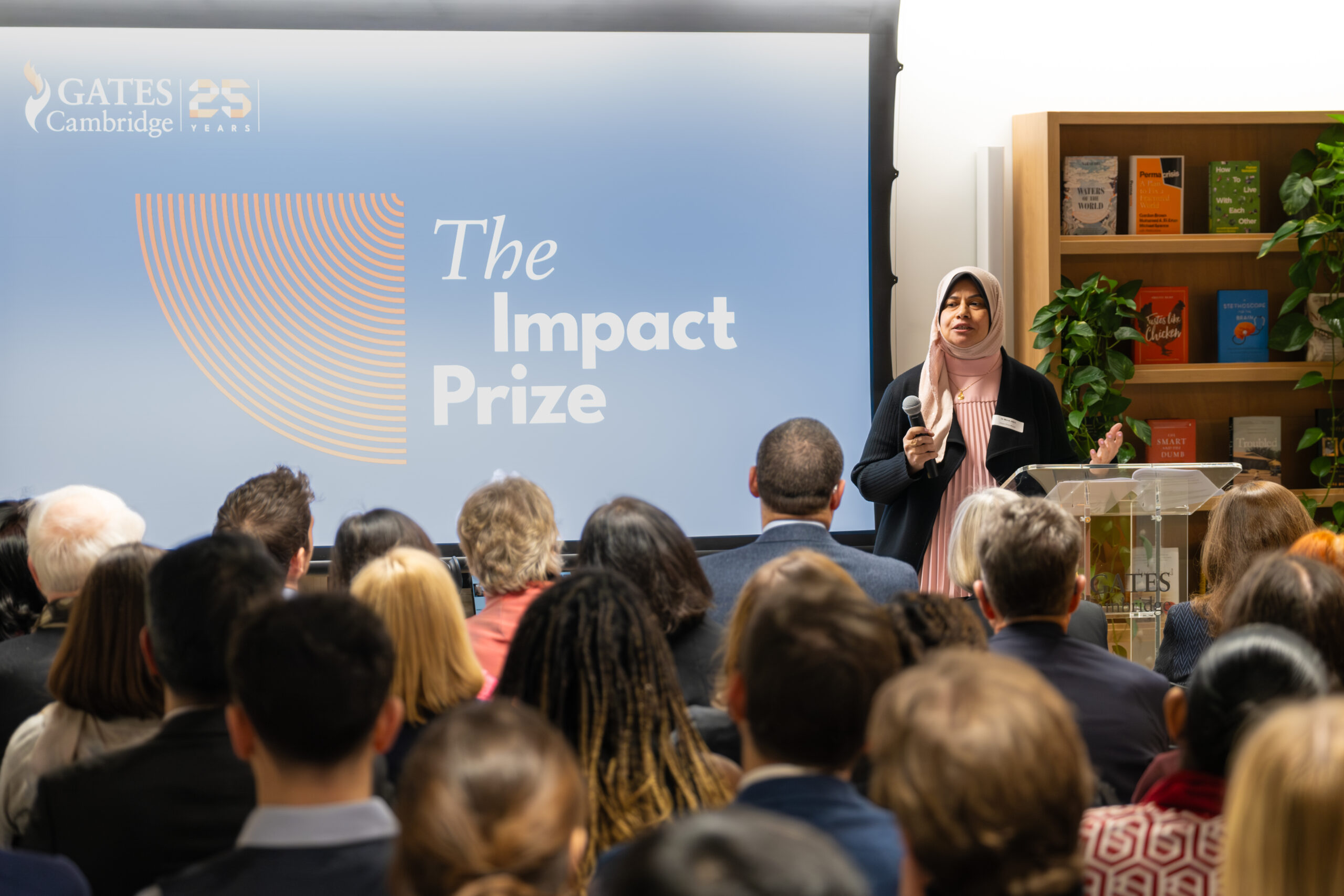 Mona Jebril [2012 – pictured left], an education and health researcher from Gaza, spoke about her trajectory from school teacher to lecturer to researcher and how, after her master’s, she struggled to make sense of the theories she had learned in the UK in the context of what was going on in Gaza on the ground. That spurred her to look for different ways to communicate her research findings, from poetry to a podcast on lives lived in conflict. She added that she was the first Gates Cambridge Scholar from Gaza in 2012, but said she would like to see more international scholarships being made available to scholars from Gaza.
Mona Jebril [2012 – pictured left], an education and health researcher from Gaza, spoke about her trajectory from school teacher to lecturer to researcher and how, after her master’s, she struggled to make sense of the theories she had learned in the UK in the context of what was going on in Gaza on the ground. That spurred her to look for different ways to communicate her research findings, from poetry to a podcast on lives lived in conflict. She added that she was the first Gates Cambridge Scholar from Gaza in 2012, but said she would like to see more international scholarships being made available to scholars from Gaza.
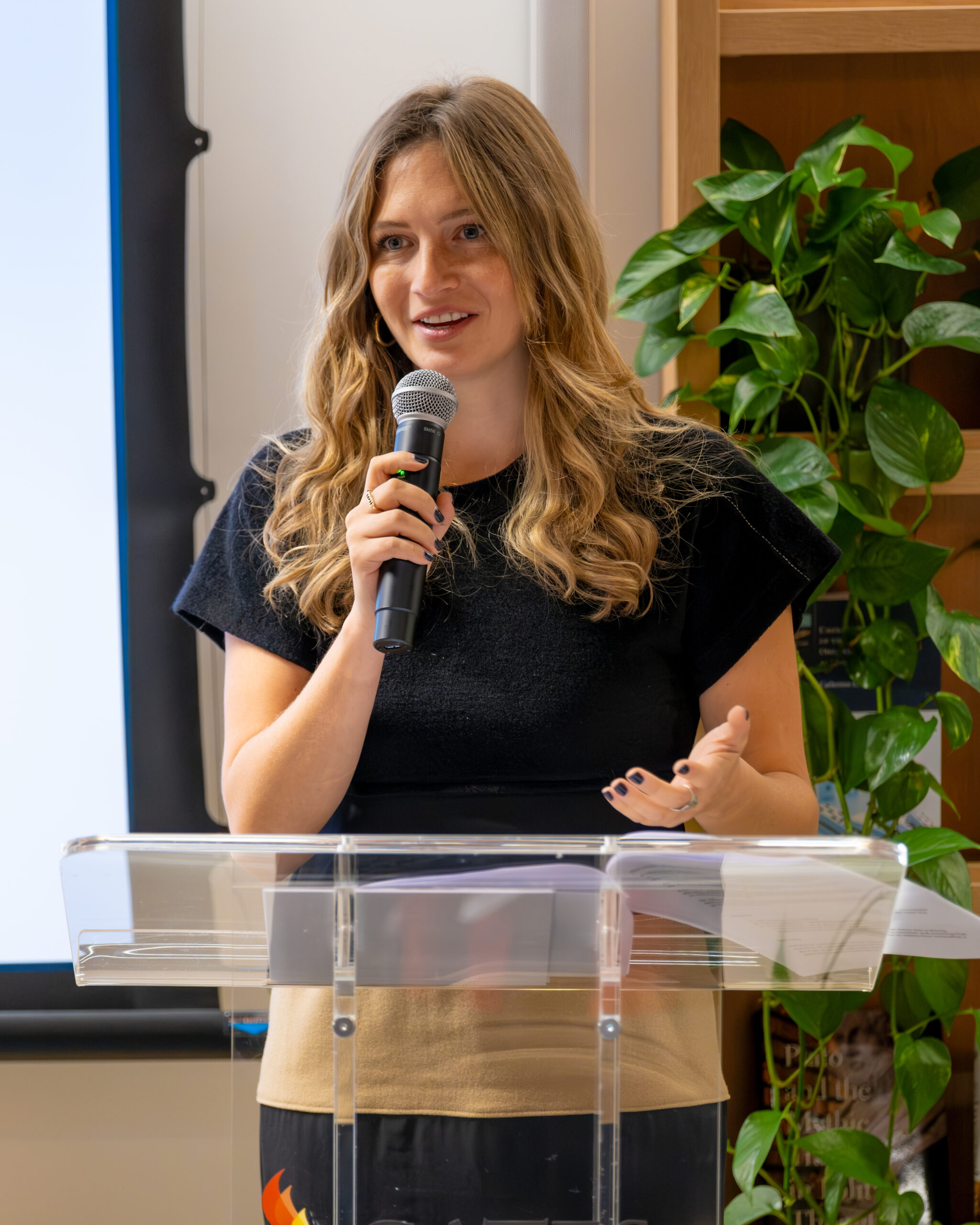 Emmy and Peabody-nominated investigative journalist and filmmaker Emily Kassie [2016 – pictured right] spoke about her award-winning film Sugarcane which looks at the long-term impact of systematic abuse on indigenous people in Canada. Her previous films have explored human rights and social issues in places such as Afghanistan and Rwanda, but once she heard about the discovery of the graves of indigenous children in her home country she said she decided to leave her job and dedicate herself to making the film with her co-director Julian Brave NoiseCat. She described the process as “the most profound journey of my life” and said it was a privilege to be trusted by the local community and allowed to tell their story. The film has been shown to politicians and indigenous groups as well as more widely and has begun conversations about the impact of child abuse in residential homes across North America. It has recently been shortlisted for an Oscar.
Emmy and Peabody-nominated investigative journalist and filmmaker Emily Kassie [2016 – pictured right] spoke about her award-winning film Sugarcane which looks at the long-term impact of systematic abuse on indigenous people in Canada. Her previous films have explored human rights and social issues in places such as Afghanistan and Rwanda, but once she heard about the discovery of the graves of indigenous children in her home country she said she decided to leave her job and dedicate herself to making the film with her co-director Julian Brave NoiseCat. She described the process as “the most profound journey of my life” and said it was a privilege to be trusted by the local community and allowed to tell their story. The film has been shown to politicians and indigenous groups as well as more widely and has begun conversations about the impact of child abuse in residential homes across North America. It has recently been shortlisted for an Oscar.
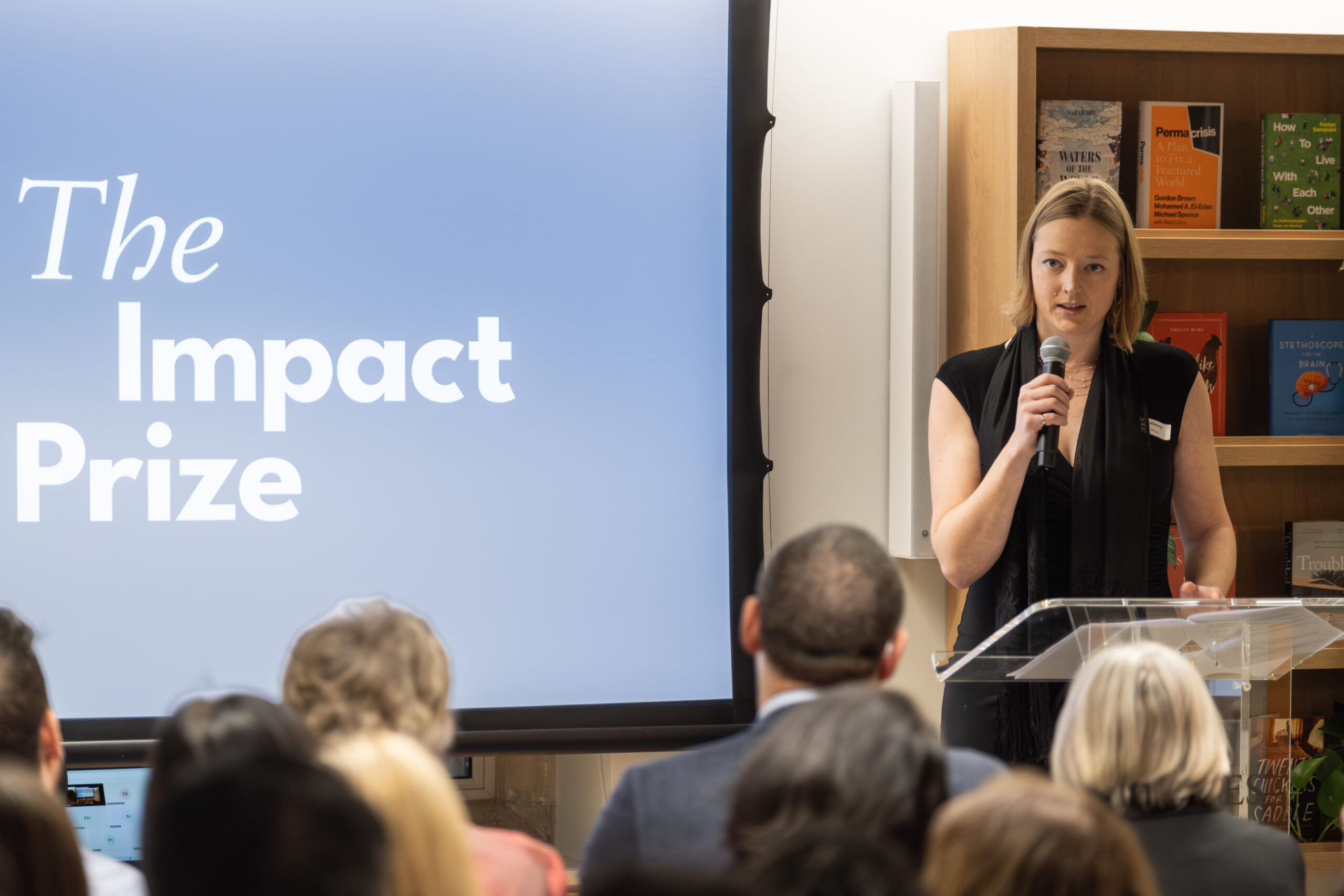 Emma Houiellebecq [2016/2021 – pictured left], whose PhD explores a new systems-based approach to building resilience in conflict regions which takes into account the whole chain of political, economic, social and technical issues that affect vital infrastructure, spoke about her previous work for the Red Cross helping build infrastructural resilience and her fieldwork in conflict zones including Gaza and Ukraine. One hospital in Gaza that she had worked on – the European Gaza Hospital – continues to function despite the bombardment of the region. Her PhD work is influencing the Red Cross’ approach to resilience planning. She said her award was also for the local technicians who risked their lives to bring hope in conflict zones.
Emma Houiellebecq [2016/2021 – pictured left], whose PhD explores a new systems-based approach to building resilience in conflict regions which takes into account the whole chain of political, economic, social and technical issues that affect vital infrastructure, spoke about her previous work for the Red Cross helping build infrastructural resilience and her fieldwork in conflict zones including Gaza and Ukraine. One hospital in Gaza that she had worked on – the European Gaza Hospital – continues to function despite the bombardment of the region. Her PhD work is influencing the Red Cross’ approach to resilience planning. She said her award was also for the local technicians who risked their lives to bring hope in conflict zones.
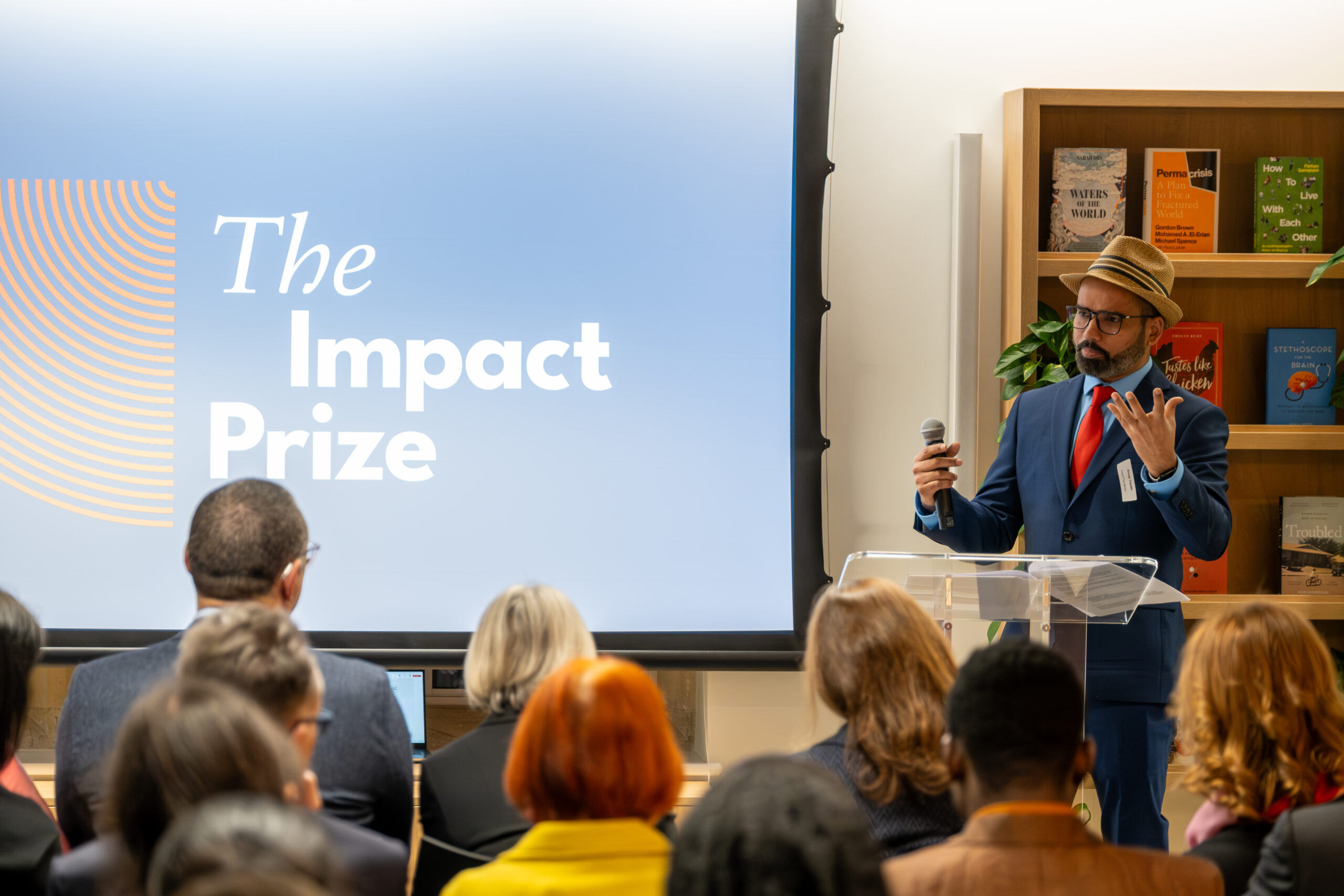 Anoop Tripathi [2022 – pictured right] talked about his research on cross-hybridisation of rice and millet which aims to develop climate-resilient crops that could ensure food security for millions of people, especially in the regions that are most affected by climate change. He is collaborating with Indian farmers to understand what they need to grow the new crop and how it will impact their lives. He paid tribute to the pioneering work of Gates Cambridge Scholar Greg Reeves who he had collaborated with on a project to graft monocots, something that was previously thought impossible.
Anoop Tripathi [2022 – pictured right] talked about his research on cross-hybridisation of rice and millet which aims to develop climate-resilient crops that could ensure food security for millions of people, especially in the regions that are most affected by climate change. He is collaborating with Indian farmers to understand what they need to grow the new crop and how it will impact their lives. He paid tribute to the pioneering work of Gates Cambridge Scholar Greg Reeves who he had collaborated with on a project to graft monocots, something that was previously thought impossible.
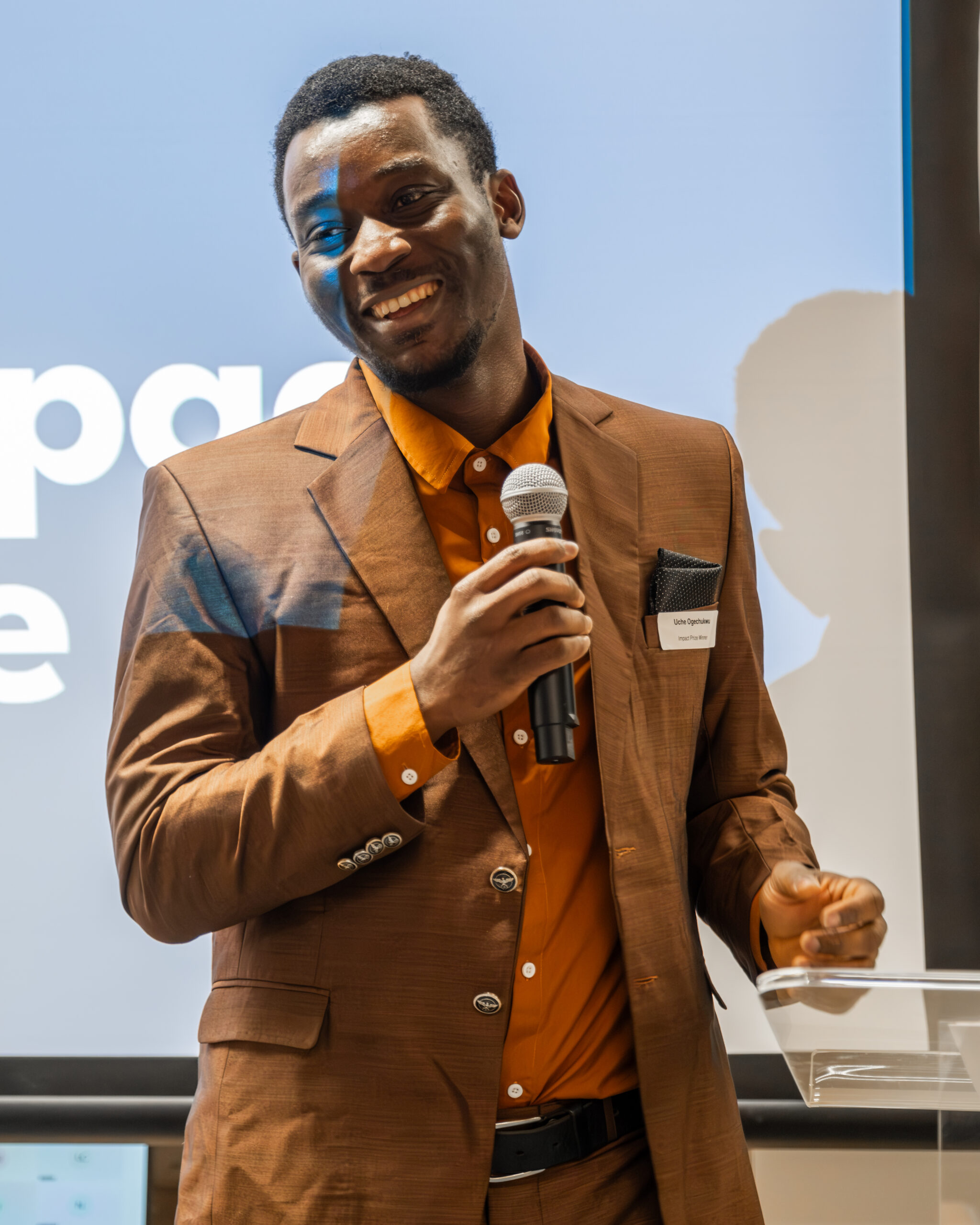 Uchechukwu Ogechukwu [2024 – pictured left] spoke about how he and his friends had co-founded solar energy company Greenage Technologies Power Systems Ltd which aims to harness renewable energy to combat energy poverty and environmental degradation in Africa. He also highlighted his work in setting up the Hardware Garage to promote other African entrepreneurs. Some have won international awards and funding as a result. Uche spoke about the satisfaction of “transforming ordinary people…into game changers” and he outlined a project to help ensure school students could finish their studies.
Uchechukwu Ogechukwu [2024 – pictured left] spoke about how he and his friends had co-founded solar energy company Greenage Technologies Power Systems Ltd which aims to harness renewable energy to combat energy poverty and environmental degradation in Africa. He also highlighted his work in setting up the Hardware Garage to promote other African entrepreneurs. Some have won international awards and funding as a result. Uche spoke about the satisfaction of “transforming ordinary people…into game changers” and he outlined a project to help ensure school students could finish their studies.
Two scholars were not able to be present and sent video acceptance speeches. Alex Vail [2010], a Bafta award-winning wildlife cinematographer, spoke about his PhD on the intelligence of fish and how his nature documentary filming aimed to bring a sense of wonder to people, including those who did not experience nature in the raw. “It shows them what there is to protect,” he stated, adding that he hopes to use the prize to show how important documentary film-making can be to conservation efforts.
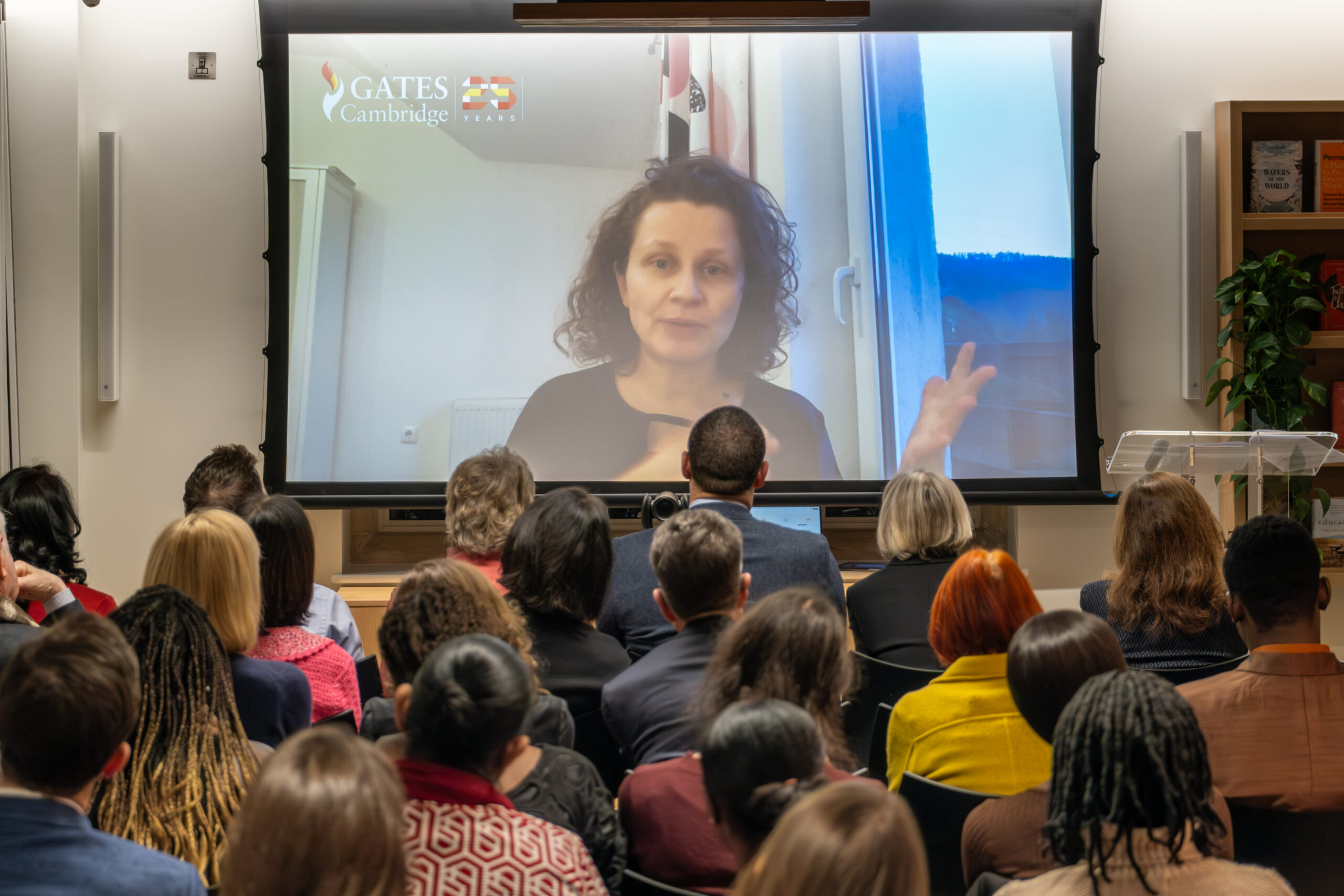 Alexandra Grigore [2012 – pictured right], Chief Strategy Officer and Co-founder of Simprints, the world’s first open-source biometric ID platform with privacy at its core, talked about how Simprints was born in the Gates Cambridge Scholars’ centre with the aim of solving identification problems in international development. Two other Scholars are co-founders and one, Toby Norman, accepted Alexandra’s prize on her behalf. Simprints now has a team of over 50 people and has worked with health ministries across the world on issues like vaccination. “We aim to improve the way the world fights poverty and disease through technology,” said Alexandra.
Alexandra Grigore [2012 – pictured right], Chief Strategy Officer and Co-founder of Simprints, the world’s first open-source biometric ID platform with privacy at its core, talked about how Simprints was born in the Gates Cambridge Scholars’ centre with the aim of solving identification problems in international development. Two other Scholars are co-founders and one, Toby Norman, accepted Alexandra’s prize on her behalf. Simprints now has a team of over 50 people and has worked with health ministries across the world on issues like vaccination. “We aim to improve the way the world fights poverty and disease through technology,” said Alexandra.
All the winners will receive £5,000 each and be invited to participate in our 2025 anniversary events.
The judges of the Impact Prize were Professor Sir Leszek Borysiewicz, the 345th Vice-Chancellor of the University of Cambridge, former Chair of Cancer Research UK and the former Chief Executive of the Medical Research Council; Joe Cerrell, The Gates Foundation Managing Director for Europe, the Middle East and East Asia; Professor Tebello Nyokong, Distinguished Professor of Chemistry at Rhodes University and the 2009 L’Oréal-UNESCO Award for Women in Science recipient; and Dr Gillian Tett, the 45th Provost of King’s College London, Moral Money Co-Founder and Member of the Editorial Board & Columnist at the Financial Times.
The ceremony was followed by a celebratory dinner. Detailed profiles of all the winners will be published this week.
*Top picture from left to right: Mona Jebril, Anoop Tripathi, Uche Ogechukwu, Emma Houiellebecq, Emily Kassie, Urbasi Sinha and Toby Norman [accepting for Alexandra Grigore].









